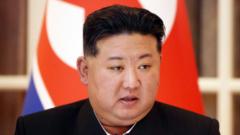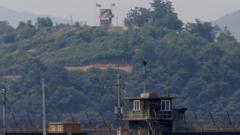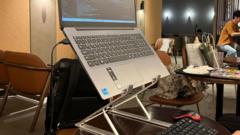In a significant display of military capability, North Korea has conducted a missile test supervised by Kim Jong Un. State media reports emphasize the technological advancements of the new air defense missiles amid tensions with South Korea, which recently fired warning shots at North Korean troops crossing the Demilitarized Zone. The complexities of inter-Korean and international relations are highlighted, raising questions about the dynamics of security in the region.
North Korea Conducts Missile Test Amid Rising Tensions on the Korean Peninsula

North Korea Conducts Missile Test Amid Rising Tensions on the Korean Peninsula
North Korean leader Kim Jong Un presides over a new missile test amid escalating tensions with South Korea, drawing international scrutiny and concerns over military alliances.
North Korean state media has reported the successful test firing of two new air defense missiles, overseen by leader Kim Jong Un. The Korean Central News Agency (KCNA) described the weapons as possessing "superior combat capability" and utilizing "unique technology," although specific details about the missiles have not been disclosed. This missile test took place on Saturday and was stated to have demonstrated that the projectiles are highly effective in targeting various aerial threats, including drones and cruise missiles.
This event occurs just hours after South Korea confirmed it fired warning shots when North Korean soldiers briefly entered the Demilitarized Zone (DMZ) that separates the two nations. According to Yonhap News Agency, about 30 North Korean troops crossed this heavily fortified border, prompting South Korean military action. Pyongyang has accused Seoul of engaging in "deliberate provocation."
The backdrop of these military maneuvers includes ongoing large-scale joint military drills being conducted by South Korea and the United States, which began on Monday. Following these developments, South Korean President Lee Jae Myung is scheduled to meet with U.S. President Donald Trump for a significant summit in Washington. Lee, who was elected on a platform aimed at fostering improved inter-Korean relations, has faced challenges as Kim Jong Un's sister has dismissed reconciliation efforts from his administration.
Earlier this month, Kim condemned the U.S. and South Korea's military exercises, labeling them as "most hostile and confrontational," and reiterated his commitment to accelerating North Korea's nuclear weapons development program. Additionally, North Korea claimed to have successfully tested an intermediate-range ballistic missile equipped with a hypersonic warhead, asserting its capability to counter any rivals in the Pacific region.
Concerns have been raised among South Korean officials regarding the possibility of North Korea acquiring Russian missile technology in exchange for military support amid Russia's ongoing aggression in Ukraine. Last year, Shin Wonsik, the national security adviser to former South Korean President Yoon Suk Yeol, indicated that North Korea may have received missile components from Moscow aimed at enhancing its air defense system. However, it remains unclear if the latest missile tests conducted by North Korea involve any foreign technology.
North Korea continues to be characterized as one of the world's most repressive totalitarian regimes, with the Kim family maintaining a tight grip on power for decades. Since the conclusion of the Korean War in 1953, the peninsula has remained divided, without a peace treaty, which leaves both nations in a state of technical warfare, albeit without recent direct confrontations.















